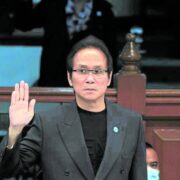A legislative agenda for the 20th Congress

The convening of the 20th Congress offers a vital opportunity to address long-standing social and economic inequities in the Philippines. At a time when public trust in institutions remains fragile, legislation must not only provide sound governance but also restore confidence in the country’s democratic processes. The following proposals form a legislative agenda that aims to strengthen accountability, promote social justice, and build a more inclusive economy.
Antipolitical dynasty law. The persistence of political dynasties undermines equal access to leadership and consolidates power among a few families. Passing an antidynasty law will broaden democratic participation and strengthen public institutions.
Transparency in bicameral meetings. Deliberations of the bicameral conference committee, particularly on the General Appropriations Act, must be open to the public. Such transparency will reduce backroom deals and improve accountability in budget negotiations.
Tax exemption for small savers. Interest income on savings up to P10 million intended for education, health, retirement, or housing should be tax-exempt. Taxation should be based not on the length of investment but on its value, thereby encouraging personal savings and financial security.
Education budget at 5 percent of gross domestic product (GDP). The Philippines must invest significantly more in education. Allocating at least 5 percent of GDP to this sector will improve quality, access, and competitiveness, ensuring long-term national development.
Regulation of lending companies. Predatory lending practices trap families in cycles of debt. Interest rates above 3.5 percent per month should be criminalized, with corresponding taxes on legal interest income. Loans beyond this threshold should be condoned to protect vulnerable borrowers.
Higher taxes on luxury, sin, and junk products. Luxury items and harmful products should face higher taxation. This policy both discourages harmful consumption and provides additional revenue for public services.
Living minimum wage. A minimum wage that truly sustains a family above the poverty threshold must be legislated. Workers deserve compensation that allows them to live with dignity.
Financial viability of the Social Security System and PhilHealth. Congress must scrutinize the finances of the SSS and PhilHealth. With 39 million members and P888 billion in assets, the per capita value of SSS resources is alarmingly low. PhilHealth’s P612 billion must also cover over 103 million dependents. Their financial viability and sustainability must be safeguarded.
Rationalization of government-owned and -controlled corporations’ compensation. The salaries of officials in GOCCs are often excessive and unjustifiable. Rationalizing compensation structures will ensure fairness and proper use of public funds.
Rules on impeachment. Congress must assert its constitutional prerogative to set the rules on impeachment. Impeachment is a political, not judicial, process; it is designed to hold high officials accountable for public trust. A motion for reconsideration in the House may be introduced to prevent judicial encroachment on this legislative duty. These rules should apply uniformly to all impeachable officials: the president, vice president, Supreme Court justices, the Ombudsman, and members of the constitutional commissions.
Opposition leaders as “fiscalizers.” Elected opposition senators are expected to provide constructive criticism of the majority. Aligning with the ruling bloc for the sake of committee assignments risks diluting their mandate as fiscalizers. Such moves must prove to serve statesmanship and not mere political expediency.
The 20th Congress has the responsibility to craft laws that respond to the people’s most urgent needs while ensuring accountability and transparency in government. From dismantling entrenched political dynasties to protecting savings, workers, and social safety nets, these measures aim to balance equity with economic growth. Congress must seize this opportunity to restore trust, strengthen democracy, and chart a course toward a just and sustainable future for the Filipino people.
—————-
Manuel V. de Leon, FMS, is a member of the Catholic religious order Marist Brothers of the Schools, president of Notre Dame of Dadiangas University, and trustee of the Catholic Educational Association of the Philippines.

















Back to the 1930s war economy